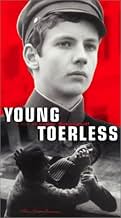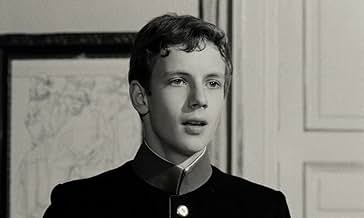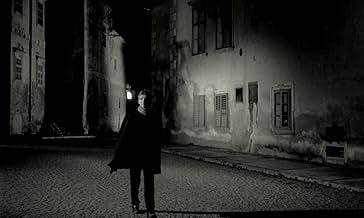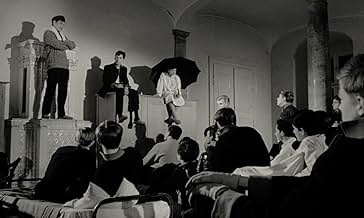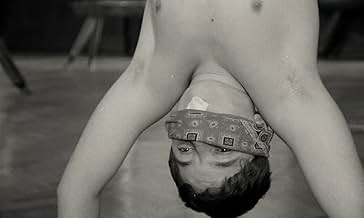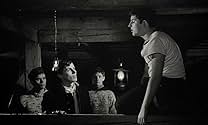IMDb RATING
7.2/10
2.9K
YOUR RATING
In a boarding school, a student observes in passive disgust as his two friends manipulate, humiliate and torture a fellow student, justifying their every act.In a boarding school, a student observes in passive disgust as his two friends manipulate, humiliate and torture a fellow student, justifying their every act.In a boarding school, a student observes in passive disgust as his two friends manipulate, humiliate and torture a fellow student, justifying their every act.
- Director
- Writers
- Stars
- Awards
- 4 wins & 1 nomination total
- Director
- Writers
- All cast & crew
- Production, box office & more at IMDbPro
7.22.8K
1
2
3
4
5
6
7
8
9
10
Featured reviews
CLASSIS AND LECTURING NEW GERMAN CINEMA FILM
Considered a classic film as it was the first film to put the then New German Film firmly on the (international) map. Also a classic because it was Schlöndorf's first feature and it is still thought highly of. To be sure, this is a beautiful film to watch with its superb black-and-white cinematography; Schlondörf's direction makes it into a well paced and staged, stylish film. But I never liked the film; recent re-viewing confirmed my feelings.
Schlöndorf wants to do more than simply bring the viewer the subject and with that the whole thing goes wrong. In trying to convey the deeper meaning of the story as clear as possible the script is written in such way that even the most simple minded can not miss it. The film is lecturing without any subtleties; Schlöndorf never provokes the viewer to think for himself: he has already done it for him. Nor is there any nuance in the psychology of the different characters.
And what about the cast? In 1966 (and still) praised for their effort as inexperienced actors. Well, I think that most of the acting is downright poor, or never goes further than reciting lines. In the meantime we have come to know Mathieu Carriere better during his career; Carriere is in this his first film as boring as he still is. Of course the actors were not helped much by the literary dialogue, another feature that was (and is) praised so much; most of it I find simply laughable. Classic miscast is Barbara Steele, who seems to have walked in from the set of a typical sexploitation film, including acting style.
Schlöndorf wants to do more than simply bring the viewer the subject and with that the whole thing goes wrong. In trying to convey the deeper meaning of the story as clear as possible the script is written in such way that even the most simple minded can not miss it. The film is lecturing without any subtleties; Schlöndorf never provokes the viewer to think for himself: he has already done it for him. Nor is there any nuance in the psychology of the different characters.
And what about the cast? In 1966 (and still) praised for their effort as inexperienced actors. Well, I think that most of the acting is downright poor, or never goes further than reciting lines. In the meantime we have come to know Mathieu Carriere better during his career; Carriere is in this his first film as boring as he still is. Of course the actors were not helped much by the literary dialogue, another feature that was (and is) praised so much; most of it I find simply laughable. Classic miscast is Barbara Steele, who seems to have walked in from the set of a typical sexploitation film, including acting style.
just to point out a few things...
1. It's been said here that the gay content of the story has been removed. Well, the novel was released in 1905. We can nowadays interpret elements of the story in a gay context, but back then these notions did not exist. If Schlöndorff hints at homosexuality as an element of perversion, that is in fact faithful to the novel, which takes a strictly observatory, non-participating stance.
2. 'Törless' is often interpreted as an indicator of upcoming intolerance and Nazidom. Again, the novel was released at a much too early time to allow for such an interpretation; the novel's author Robert Musil certainly envisioned the inevitable fall of an empire stuck to tradition and incapable of accommodating personal liberties. Schlöndorff pushes some of the juvenile delinquents into similarities with the Nazis - albeit being carefully ambiguous about it -, but it would be wrong to consider this interpretation as a part of the original narrative.
3. 'Törless' is a highly psychological tale and film - again, Schlöndorff proves faithful to the novel in this respect. But this comes with the weakness of constructing characters around a certain social concept. It would be misleading to consider Törless and his rebellious friends as typical representatives of their era, or real figures upon which the author based his characters. As may be more obvious in Musil's masterpiece, 'The Man without Qualities', his characters are crafted to evoke rather a situation than a person; that makes his books almost impossible to adapt correctly.
Schlöndorff's film is somewhat middlebrow; it does not intend to be a substitute for reading the novel, but at the same time it carefully avoids to give the impression that it is anything but a rendition of it. That's not quite true; the interpretation is in the framing, the omissions of the subtext, and that the ideas upon watching the film differ considerably from those you get when you read the novel. One may call it therefore a failure - but an interesting failure to watch.
2. 'Törless' is often interpreted as an indicator of upcoming intolerance and Nazidom. Again, the novel was released at a much too early time to allow for such an interpretation; the novel's author Robert Musil certainly envisioned the inevitable fall of an empire stuck to tradition and incapable of accommodating personal liberties. Schlöndorff pushes some of the juvenile delinquents into similarities with the Nazis - albeit being carefully ambiguous about it -, but it would be wrong to consider this interpretation as a part of the original narrative.
3. 'Törless' is a highly psychological tale and film - again, Schlöndorff proves faithful to the novel in this respect. But this comes with the weakness of constructing characters around a certain social concept. It would be misleading to consider Törless and his rebellious friends as typical representatives of their era, or real figures upon which the author based his characters. As may be more obvious in Musil's masterpiece, 'The Man without Qualities', his characters are crafted to evoke rather a situation than a person; that makes his books almost impossible to adapt correctly.
Schlöndorff's film is somewhat middlebrow; it does not intend to be a substitute for reading the novel, but at the same time it carefully avoids to give the impression that it is anything but a rendition of it. That's not quite true; the interpretation is in the framing, the omissions of the subtext, and that the ideas upon watching the film differ considerably from those you get when you read the novel. One may call it therefore a failure - but an interesting failure to watch.
An indictment of the military system and its dehumanization
Faithfully adapted from author Robert Musil, this study of sadism and masochism among students at an Austro-Hungarian boys prep school is a parable of fascism and its origins. Barbara Steele is radiant and splendid as Bozena the prostitute who awakens the nascent sexual nature of the adolescent students. Lovingly photographed in black and white, YOUNG TORLESS evokes the mood and claustrophobic horror of the dehumanizing military system. Matthew Carriere gives an unblemished and heartfelt performance as an innocent caught behind the barbed wire walls of his very soul and the duty to which he has been placed. A must-see for everyone and an advocacy for pacificism. This was Volker Schloendorff's first film, and by admission one of Barbara Steele's favorite roles.
powerful themes
people should not be distracted about the specifics of the plot,or the tangential,secondary themes of cruelty/sexuality..schlondorf has made his metaphor clear and passionate..people in positions of power(due to talent,wealth,titles of authority,physical stregnth,etc)are not entitled to abuse others,no matter what their alleged justification;and people who witness such abuses and do nothing are worse than enablers, they are accomplices..the obvious association is with the Nazis,but this is a universal problem that could be likened to the Spanish inquisition,the salem witch trials,the torture of prisoners during the iraq war,the red scare hearings and countless others..my own feel is that torless is held up as someone who contributes mightily to this particular evil,but fools himself into thinking he's not involved..his final speech was a lame attempt to justify his conduct..the film may not have been entertaining,but it was thought-provoking
Kids these days...
By today's standards, a film like "Young Torless" may seem too coy and archly philosophical (and thus pretentious) a take on the corruption of youth, and the sources from which the corruption stems. Its strength, however, lies in the telling: when a student at a preparatory academy robs a peer to pay off a debt, he finds himself enslaved, both psychologically and sexually, by a gang of rogues looking to push him to the breaking point. In the midst of this is Torless (Matthieu Carriere), a student coming to terms with his identity in the midst of this moral dilemma, and whose mental landscape renders him a frustrated, conflicted character who runs the gamut from cold detachment to vague sympathy. While certain aspects of the film (the homosexual subplot, for instance) seem deliberately repressed due to the era, the implication is enough to give the events an additional potency. The black-and-white cinematography is excellent, capturing a specific atmosphere of dread and meditative solitude--German director Volker Schlondorff is not looking to titillate with sensationalist content, but instead spin a story of a young adult's struggle with the evils of an imperfect world. And on that level, "Young Torless" is one of the best films of its kind.
Did you know
- TriviaLuchino Visconti had previously tried to set up a version of " Young Torless " with Romy Schneider starring.
- Quotes
Thomas Törless: Yet another day to tell our grandchildren about.
- ConnectionsFeatured in Film Review: International Films (1968)
- How long is Young Törless?Powered by Alexa
Details
- Release date
- Countries of origin
- Language
- Also known as
- Young Torless
- Filming locations
- Eggenberg Palace, Graz, Styria, Austria(military school)
- Production companies
- See more company credits at IMDbPro
- Runtime
- 1h 27m(87 min)
- Color
- Sound mix
- Aspect ratio
- 1.66 : 1
Contribute to this page
Suggest an edit or add missing content

